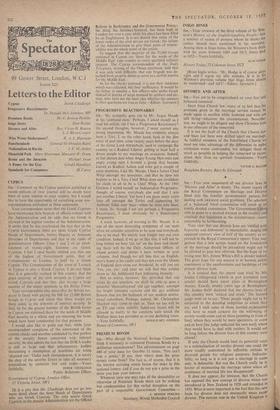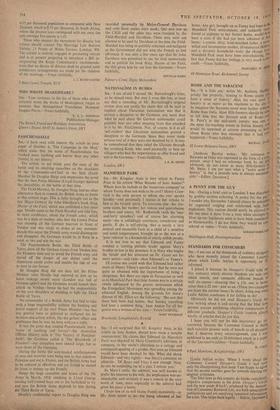SIR,—Your sane assessment of our divorce laws in 'Divorce and
After' is timely. The recent report of the Royal Commission on Marriage and Divorce fitted into the familiar governmental pattern for dealing with awkward social problems. The selection of a 'balanced' royal commission will result in an evenly divided commission. The Governments ikthus, able to point to a marked division ih the country and conclude that legislation in the circumstances cannot reasonably be forthcoming.
Your view that our divorce laws are 'riddled with hypocrisy and dishonesty' is unassailable, despite the apparent contrary view of half of the country as ex- pressed in the Royal Commission's report. Your sug- gestion that a new system based on the breakdown of the marriage should 'be introduced ought not to be allowed to pass into oblivion. But the hope of re- viving now Mrs. Eirenc White's Bill is slender indeed. The great hope for any success is to harness public resentment at the anachronisms and hardships of the present divorce laws.
\ It is ironical that, the recent case tried by Mr. Justice Collingwood (which in part prompted your article) should 'have taken place at Birmingham Assizes. Exactly twenty years ago at Birmingham. Mr. Justice Swift declared that the diyorce laws of this country were 'wicked and cruel.' The learned judge went on to say: 'These people ought not to he subjected to the dreadful indignities to which they are, and I wish some of those learned ecclesiastics who have so much concern for the well-being of society would come and sit there [pointing in front of him], where they would be' mere spectators, or come and sit here [the judge indicated his own seat], where they would have to deal with matters. It would not be long before the divorce laws of this country were altered.'
If only the Church would lend its powerful voice to a rationalisation of secular divorce one could the more readily understand its inflexible attitude to divorced people for, religious purposes. Indissolu- bility, so long as it is not just a marriage in name Only, is defensible. But can the Church really be in favour of maintaining the marriage union where all semblance of married life has disappeared?
It does not appear, for instance, that the Church has opposed this new concept of divorce which was introduced in New Zealand in 1920 and extended in 1953. What is more important is the fact that this new basis for divorce does not necessarily mean easier divorce. The current rate in the United Kingdom is • 0.55 per thousand population as compared with New Zealand, which is 0.73 per thousand. In South Africa, where the divorce laws correspond with our own, the rate amongst Europeans is 1.43.
Those who support the movement for divorce law reform should contact The Marriage Law Reform Society, .13 Prince of Wales Terrace, London, W8. The society is actively engaged in promoting reform and is at present preparing to introduce a Bill in- corporating the Royal Commission's recommenda- tions that no decree of divorce shall be granted until satisfactory arrangements are made for the children of the marriage.—Yours faithfully,



































 Previous page
Previous page